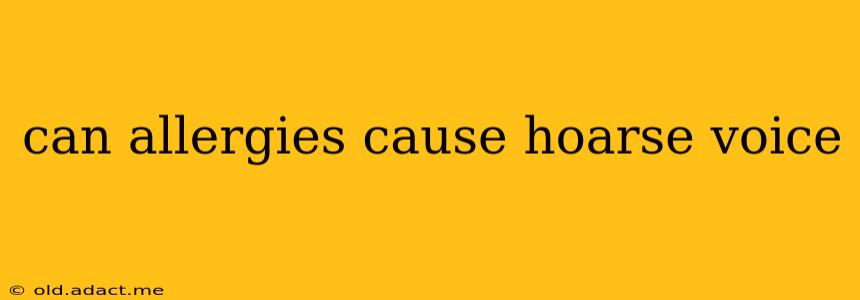Allergies can certainly wreak havoc on your body, and a hoarse voice is a surprisingly common symptom that many overlook. While not always the most prominent sign, allergy-induced hoarseness is a real phenomenon, stemming from the body's inflammatory response to allergens. This comprehensive guide delves into the connection between allergies and a hoarse voice, exploring the underlying mechanisms and offering helpful advice.
How Allergies Lead to a Hoarse Voice
Allergies trigger the release of histamine and other inflammatory chemicals. This process, while essential for defending against perceived threats, can also cause significant irritation and swelling in the mucous membranes lining the throat and vocal cords. This swelling and inflammation can make your voice sound raspy, breathy, or altogether hoarse.
Think of your vocal cords as delicate instruments. When inflamed, they can't vibrate as efficiently, resulting in that characteristic hoarse sound. The irritation also increases the risk of developing other throat issues like a cough, making the hoarseness even more persistent.
What Specific Allergies Might Cause Hoarseness?
While any allergic reaction can potentially lead to throat irritation, some are more likely culprits than others:
- Seasonal Allergies (Hay Fever): Pollen from trees, grasses, and weeds is a major trigger for seasonal allergic rhinitis, which often manifests as post-nasal drip. This drip irritates the throat and vocal cords, contributing to hoarseness.
- Food Allergies: Certain food allergies can trigger a significant inflammatory response, potentially involving the throat and vocal cords. This is especially true if the allergen is ingested and causes swelling in the throat or upper respiratory tract.
- Pet Allergies: Pet dander, a common allergen, can cause similar symptoms to pollen allergies, leading to post-nasal drip and consequent throat irritation.
Can Allergies Cause a Persistent Hoarse Voice?
Yes, allergies can indeed cause a persistent hoarse voice if left untreated. Chronic inflammation from ongoing allergic reactions can lead to prolonged irritation and swelling of the vocal cords. This constant irritation can even potentially damage your vocal cords over time, if the underlying allergy isn't addressed.
How Long Does Allergy-Related Hoarseness Last?
The duration of allergy-related hoarseness varies greatly depending on several factors:
- Severity of the allergic reaction: A mild reaction might only cause temporary hoarseness for a day or two, while a severe reaction could last much longer.
- Exposure to allergens: Continued exposure to allergens will prolong the symptoms.
- Treatment: Prompt and effective allergy management significantly reduces the duration of hoarseness.
What Other Symptoms Might Accompany a Hoarse Voice Due to Allergies?
Hoarseness rarely stands alone as a symptom of allergies. It is often accompanied by other tell-tale signs, including:
- Runny nose: This is a classic sign of allergic rhinitis.
- Sneezing: Frequent sneezing fits are common during allergic episodes.
- Itchy eyes, nose, and throat: The irritation extends beyond just the vocal cords.
- Cough: The throat irritation often leads to a persistent cough.
- Congestion: Allergic reactions can cause nasal and sinus congestion.
How to Treat Allergy-Related Hoarseness
The best approach is a two-pronged strategy: addressing the underlying allergy and managing the symptoms.
- Identify and Avoid Allergens: The first step is identifying your specific allergens through allergy testing. Once identified, avoiding these triggers is crucial in preventing future episodes of hoarseness.
- Allergy Medications: Antihistamines, decongestants, and nasal corticosteroids can effectively reduce inflammation and alleviate symptoms. Your doctor can help determine the most appropriate medication for your situation.
- Hydration: Drinking plenty of water helps to keep your throat moist and lubricated, aiding in vocal cord recovery.
- Vocal Rest: Avoiding excessive talking or shouting allows your vocal cords to heal.
- Humidifier: Using a humidifier can add moisture to the air, preventing further dryness and irritation.
When to See a Doctor
While most allergy-related hoarseness resolves with home remedies and over-the-counter medications, you should consult a doctor if:
- Your hoarseness persists for more than two weeks.
- You experience difficulty breathing or swallowing.
- Your voice changes significantly or worsens.
- You have other concerning symptoms, like a high fever.
This information is for general knowledge and does not constitute medical advice. Always consult with a healthcare professional for diagnosis and treatment of any medical condition.
